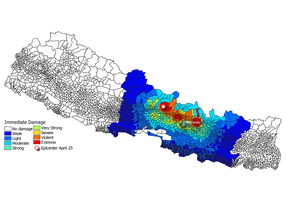
Distortions in Aid Allocation of United Nations Flash Appeals: Evidence from the 2015 Nepal Earthquake
Vera Eichenauer, Andreas Fuchs, Sven Kunze and Eric Strobl
Published in: World Development 136: 105023, December 2020.
Abstract
We examine the design and implementation of the United Nations Flash Appeal triggered in response to the highly destructive 2015 Nepal earthquake. We consider how local need and various distortions affect the proposed project number, the proposed financial amount, and the subsequent funding decision by aid donors. Specifically, we investigate the extent to which the allocation of this humanitarian assistance follows municipalities’ affectedness and their physical and socio-economic vulnerabilities. We then analyze potential ethnic, religious, and political distortions. Our results show that aid allocation is associated with geophysical estimates of the earthquake damage. Controlled for disaster impact, however, aid allocation shows little regard for the specific socio-economic and physical vulnerabilities. It is also worrisome that the allocation of the flash appeal commitments favors municipalities dominated by higher castes and disadvantages those with a greater distance to the Nepali capital Kathmandu.
Published paper
Supplementary material
Working paper (May 2019)
Working paper (February 2019)
Underlying dataset
Presentations at conferences and workshops
Vera Eichenauer, Andreas Fuchs, Sven Kunze and Eric Strobl
Published in: World Development 136: 105023, December 2020.
Abstract
We examine the design and implementation of the United Nations Flash Appeal triggered in response to the highly destructive 2015 Nepal earthquake. We consider how local need and various distortions affect the proposed project number, the proposed financial amount, and the subsequent funding decision by aid donors. Specifically, we investigate the extent to which the allocation of this humanitarian assistance follows municipalities’ affectedness and their physical and socio-economic vulnerabilities. We then analyze potential ethnic, religious, and political distortions. Our results show that aid allocation is associated with geophysical estimates of the earthquake damage. Controlled for disaster impact, however, aid allocation shows little regard for the specific socio-economic and physical vulnerabilities. It is also worrisome that the allocation of the flash appeal commitments favors municipalities dominated by higher castes and disadvantages those with a greater distance to the Nepali capital Kathmandu.
Published paper
Supplementary material
Working paper (May 2019)
Working paper (February 2019)
Underlying dataset
Presentations at conferences and workshops
- Beyond Basic Questions Workshop, Gengenbach/Black Forest, Germany (08/2018)
- Annual International Conference of the VfS Research Group on Development Economics, University of Goettingen, Germany (06/2017)
- Columbia University’s Alliance Graduate Summer School “Research Methods in Sustainable Development”, Columbia Global Centers Paris, France (05/2017)
- Young Scientists Workshop of the VfS Research Group on Environmental and Resource Economics, University of Basel, Switzerland (02/2017)
